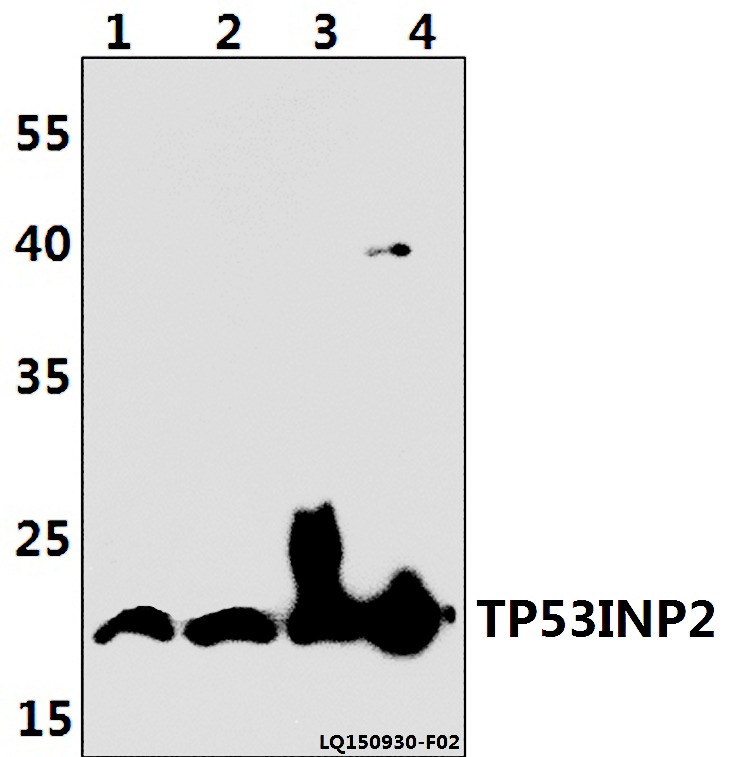Product Name :
TP53INP2 polyclonal antibody Background :
TP53INP2 (tumor protein p53 inducible nuclear protein 2), also known as DOR or PINH, is a 220 amino acid nuclear protein that is expressed in developing murine brain and spinal cord, as well as in the sensory and motor neuron tracts of the peripheral nervous system. A novel protein involved in the autophagy of mammalian cells, TP53INP2 translocates from the nucleus to the autophagosome structures after activation of autophagy by rapamycin or starvation. Necessary for autophagosome development and considered a scaffold protein, TP53INP2 recruits LC3 and/or LC3-related proteins, such as GABARAP and GABARAP-like2, to the autophagosome membrane by interacting with the transmembrane protein TMEM49. The gene encoding TP53INP2 is located on human chromosome 20, which is comprised of approximately 2% of the human genome and contains nearly 63 million bases that encode over 600 genes. Product :
Rabbit IgG, 1mg/ml in PBS with 0.02% sodium azide, 50% glycerol, pH7.2 Storage&Stability :
Store at 4°C short term. Aliquot and store at -20°C long term. Avoid freeze-thaw cycles. Specificity :
TP53INP2 polyclonal antibody detects endogenous levels of TP53INP2 protein. Immunogen :
Synthetic peptide, corresponding to amino acids 148-193 of Human TP53INP2. Conjugate :
Unconjugated Modification :
Unmodification
TP53INP2 polyclonal antibody Background :
TP53INP2 (tumor protein p53 inducible nuclear protein 2), also known as DOR or PINH, is a 220 amino acid nuclear protein that is expressed in developing murine brain and spinal cord, as well as in the sensory and motor neuron tracts of the peripheral nervous system. A novel protein involved in the autophagy of mammalian cells, TP53INP2 translocates from the nucleus to the autophagosome structures after activation of autophagy by rapamycin or starvation. Necessary for autophagosome development and considered a scaffold protein, TP53INP2 recruits LC3 and/or LC3-related proteins, such as GABARAP and GABARAP-like2, to the autophagosome membrane by interacting with the transmembrane protein TMEM49. The gene encoding TP53INP2 is located on human chromosome 20, which is comprised of approximately 2% of the human genome and contains nearly 63 million bases that encode over 600 genes. Product :
Rabbit IgG, 1mg/ml in PBS with 0.02% sodium azide, 50% glycerol, pH7.2 Storage&Stability :
Store at 4°C short term. Aliquot and store at -20°C long term. Avoid freeze-thaw cycles. Specificity :
TP53INP2 polyclonal antibody detects endogenous levels of TP53INP2 protein. Immunogen :
Synthetic peptide, corresponding to amino acids 148-193 of Human TP53INP2. Conjugate :
Unconjugated Modification :
Unmodification
-
 Western blot (WB) analysis of TP53INP2 polyclonal antibody at 1:500 dilution Lane1:PC12 whole cell lysate(40ug) Lane2:NIH-3T3 whole cell lysate(40ug) Lane3:HEK293T whole cell lysate(40ug) Lane4:RAW264.7 whole cell lysate(40ug)
Western blot (WB) analysis of TP53INP2 polyclonal antibody at 1:500 dilution Lane1:PC12 whole cell lysate(40ug) Lane2:NIH-3T3 whole cell lysate(40ug) Lane3:HEK293T whole cell lysate(40ug) Lane4:RAW264.7 whole cell lysate(40ug)
Bioworld Biotech only provide peptides for our antibodies and do not provide additional peptide customization services.
Price/Size :
USD 368/1mg/vial
Tips:
For phospho antibody, we provide phospho peptide(0.5mg) and non-phospho peptide(0.5mg).Describe :
Blocking peptides are peptides that bind specifically to the target antibody and block antibody binding. These peptide usually contains the epitope recognized by the antibody. Antibodies bound to the blocking peptide no longer bind to the epitope on the target protein. This mechanism is useful when non-specific binding is an issue, for example, in Western blotting (WB) and Immunohistochemistry (IHC). By comparing the staining from the blocked antibody versus the antibody alone, one can see which staining is specific; Specific binding will be absent from the western blot or IHC performed with the neutralized antibody.Formula:
Synthetic peptide was lyophilized with 100% acetonitrile and is supplied as a powder. Reconstitute with 0.1 ml DI water for a final concentration of 10 mg/ml.The purity is >90%,tested by HPLC and MS.
Storage:
The freeze-dried powder is more stable. For short time at 2-8°C. For long term storage store at -20°C.
Note :
This product is for research use only (RUO only). Not for use in diagnostic or therapeutic procedures.
 TP53INP2 polyclonal antibody
TP53INP2 polyclonal antibody  Datasheet
Datasheet COA
COA MSDS
MSDS SHIP
SHIP